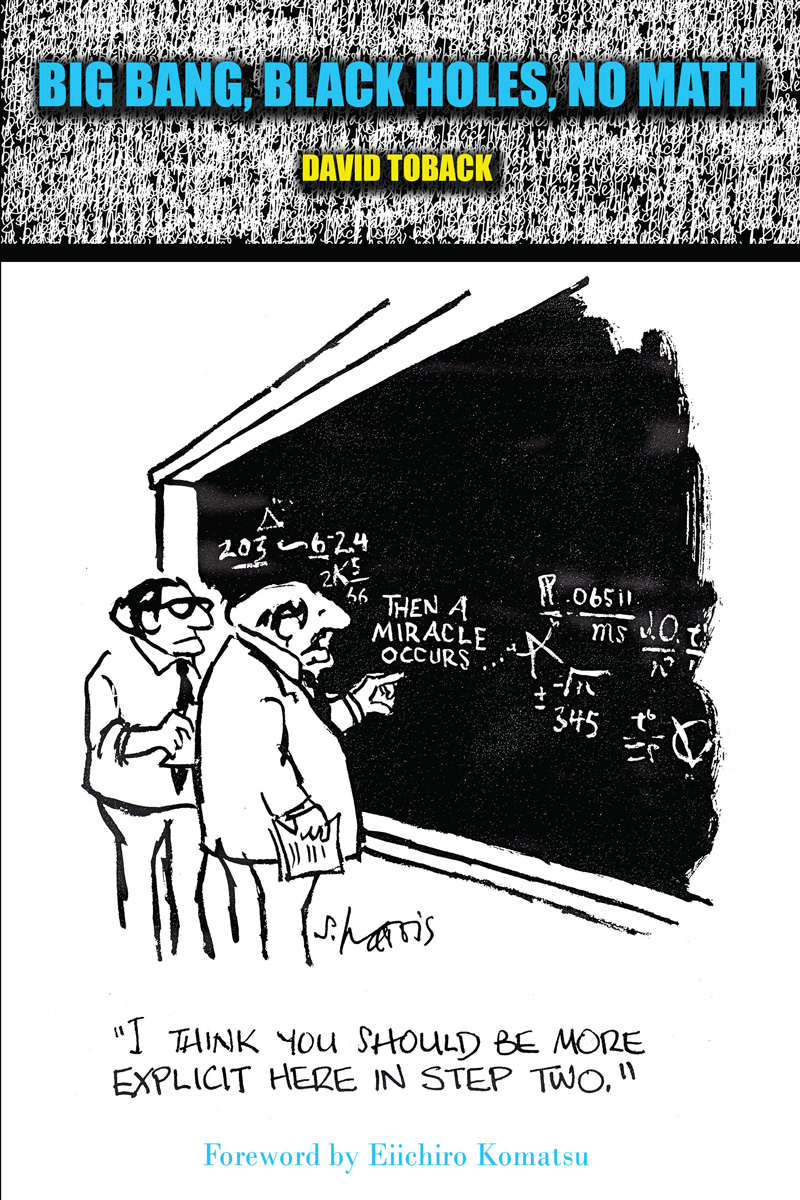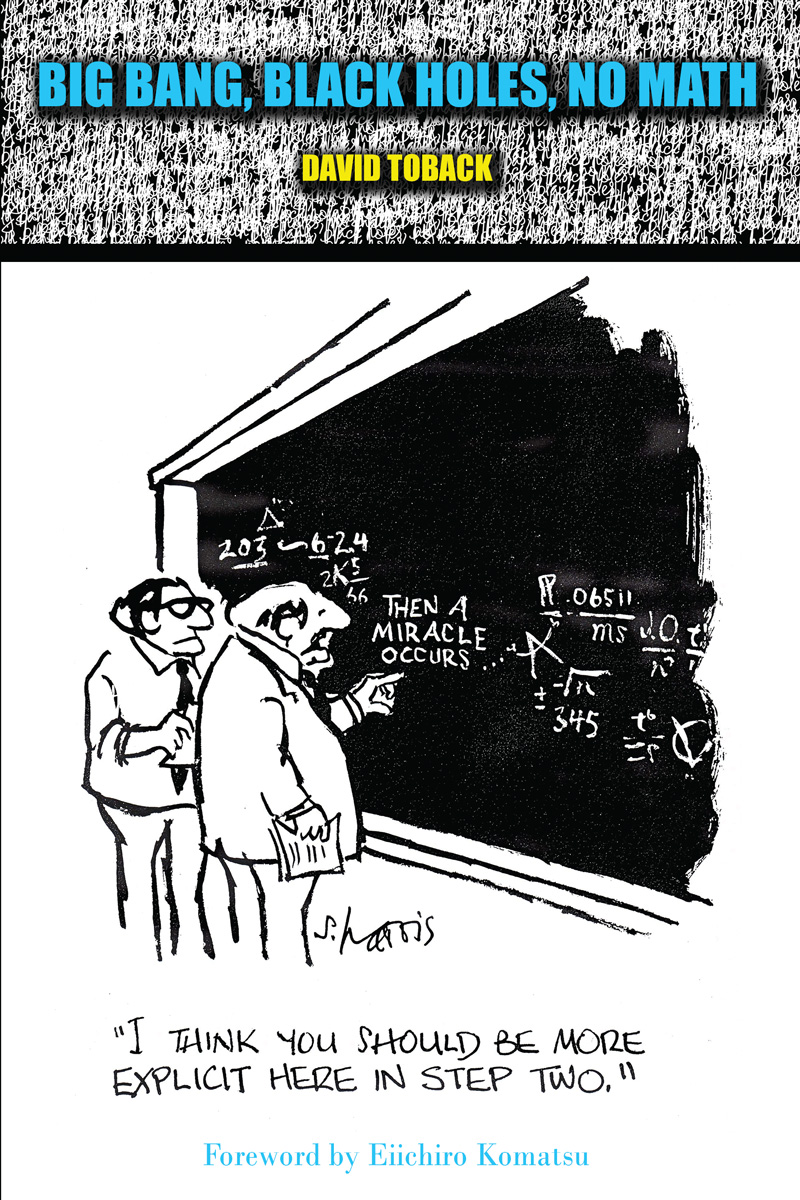Big Bang, Black Holes, No Math
Choose Your Format
Ebook
This product is currently not available.
David Toback's (Texas A&M University) publication answers the calls of students and instructors!
Big Bang, Black Holes, No Math is a one-of-a-kind publication that shares with the reader just how exciting the universe has been throughout its history in a way non-majors can understand, enjoy and appreciate.
Featuring a minimal-math hands-on approach to cosmology and written in a language that anyone can understand, Big Bang, Black Holes, No Math takes head-on the myth that these topics can't be taught effectively without the math. Vetted by top cosmologists, particle physics and astronomers, the book is full of useful analogies and illustrations.
Affordably-priced in print and eBook formats that students can purchase directly from Kendall Hunt Publishing, Big Bang, Black Holes, No Math:
- Introduces the reader to the fun stuff: cosmology, the big bang, black holes, particle physics, dark matter, dark energy and astronomy immediately.
- Is field tested and proven! The package has been used by cosmology, physics, and astronomy instructors in special topics, honors, and seminar courses, as well as a supplementary course in introductory astronomy courses.
- Is instructor friendly! The author has provided a full set of complementary materials to help instructors. This includes conceptual questions, end-of-chapter quizzes and more to assess learning and comprehension of material presented.
- Can be bundled with an accompanying lab manual with access to free online laboratory material to provide a hands-on approach to astronomy.
UNIT 1: Introduction: Big and Small Stuff
Chapter 1: Introduction
Chapter 2: Going Big
Chapter 3: Going Small
Chapter 4: Evidence and the Scientific Method
UNIT 2: Physics We Need: General Relativity, Dark Matter, and Quantum Mechanics
Chapter 5: Light and Doppler Shifts
Chapter 6: Gravity, General Relativity, and Dark Matter
Chapter 7: Atomic Physics and Quantum Mechanics
Chapter 8: Nuclear Physics and Chemistry
Chapter 9: Temperature and Thermal Equilibrium
UNIT 3: The Evidence for the Big Bang
Chapter 10: The Exploding Universe
Chapter 11: Expanding Space-Time
Chapter 12: Photons and Hydrogen in the Universe
UNIT 4: The Evolution of the Universe: What Happened After the Bang
Chapter 13: The Early Universe
Chapter 14: After the First Three Minutes
UNIT 5: Massive Things: Galaxies, Stars, and Black Holes
Chapter 15: Galaxies
Chapter 16: Stars
Chapter 17: Black Holes
UNIT 6: Early Times, Dark Energy, and the Fate of the Universe
Chapter 18: Possible Fates of the Universe, Dark Matter, and Dark Energy
Chapter 19: Particle Physics, Dark Matter, and the Very Early Universe
Chapter 20: Inflation and the Earliest Moments in Time
“Big Bang, Black Holes, No Math has a clear and singular goal: to explain recent exciting developments in cosmology—our understanding of how the universe works—in everyday language… Big Bang, Black Holes, No Math fills the gap. This is exactly the kind of book needed to communicate the exciting, revolutionizing developments in our understanding of the universe to the general public, in the language that anyone can understand.”
From the forward by Eiichiro Komatsu, Professor and Director of the Max-Plank-Institute for Astrophysics
“Big Bang, Black Holes, No Math provides a good and reliable understanding of the remarkable progress in our description of our physical universe, for any curious person. He presents the current developments and the historical context needed to grasp them, and makes our universe accessible to a much larger group of people.”
Gordon Kane, Victor Weisskopf Distinguished University Professor of Physics at the University of Michigan, and director emeritus of the Michigan Center for Theoretical Physics. He is the author of Supersymmetry and Beyond
“Big Bang, Black Holes, No Math’s fun and accessible writing makes the history come alive as it shows the real detective work that was done by real scientists. In the same way that a crime scene tells you what happened through its clues, we see how the universe tells us how it came to be today. It’s not just what we know about the universe, but a real illustration of how we know what we know. It clears away the old and wrong intuition, and allows the universe tells us about itself in its own way. If I were going to write a book on cosmology, this is how I would have done it. I highly recommend it.”
Hakeem Oluseyi, Astrophysicist/Professor at the Florida Institute of Technology. Co-host of Outrageous Acts of Science and Ted Fellow
“There are many textbooks on cosmology, and many popular accounts as well. But as far as I am aware, Toback’s Big Bang, Black Holes, No Math is unique in that it is avoids the technical jargon and reliance on mathematics that is found in textbooks, while still managing to actually teach the subject of cosmology. There are certainly many students and other readers who will benefit from and enjoy the middle path taken by this book.”
Dan Hooper, Theoretical Astrophysicist/Professor at the University of Chicago and Fermi National Accelerator Laboratory, and Author of Nature’s Blueprint and Dark Cosmos
“In Big Bang, Black Holes, No Math, Dave Toback aspires to talk about the physics of the cool stuff in the universe with those of curious mind. He has succeeded with a conceptually accessible book, honed by classroom experience.”
J. Craig Wheeler is the Samuel T. and Fern Yanagisawa Regents Professor of Astronomy at the University of Texas. He is a former President of the American Astronomical Society and is the author of Cosmics Catastrophes
Chapter Six: Gravity, General Relativity, and Dark Matter
Prof strips the math, makes the cosmos more relatable
From November 3, 2014 issue of The Battalion
David Toback's (Texas A&M University) publication answers the calls of students and instructors!
Big Bang, Black Holes, No Math is a one-of-a-kind publication that shares with the reader just how exciting the universe has been throughout its history in a way non-majors can understand, enjoy and appreciate.
Featuring a minimal-math hands-on approach to cosmology and written in a language that anyone can understand, Big Bang, Black Holes, No Math takes head-on the myth that these topics can't be taught effectively without the math. Vetted by top cosmologists, particle physics and astronomers, the book is full of useful analogies and illustrations.
Affordably-priced in print and eBook formats that students can purchase directly from Kendall Hunt Publishing, Big Bang, Black Holes, No Math:
- Introduces the reader to the fun stuff: cosmology, the big bang, black holes, particle physics, dark matter, dark energy and astronomy immediately.
- Is field tested and proven! The package has been used by cosmology, physics, and astronomy instructors in special topics, honors, and seminar courses, as well as a supplementary course in introductory astronomy courses.
- Is instructor friendly! The author has provided a full set of complementary materials to help instructors. This includes conceptual questions, end-of-chapter quizzes and more to assess learning and comprehension of material presented.
- Can be bundled with an accompanying lab manual with access to free online laboratory material to provide a hands-on approach to astronomy.
UNIT 1: Introduction: Big and Small Stuff
Chapter 1: Introduction
Chapter 2: Going Big
Chapter 3: Going Small
Chapter 4: Evidence and the Scientific Method
UNIT 2: Physics We Need: General Relativity, Dark Matter, and Quantum Mechanics
Chapter 5: Light and Doppler Shifts
Chapter 6: Gravity, General Relativity, and Dark Matter
Chapter 7: Atomic Physics and Quantum Mechanics
Chapter 8: Nuclear Physics and Chemistry
Chapter 9: Temperature and Thermal Equilibrium
UNIT 3: The Evidence for the Big Bang
Chapter 10: The Exploding Universe
Chapter 11: Expanding Space-Time
Chapter 12: Photons and Hydrogen in the Universe
UNIT 4: The Evolution of the Universe: What Happened After the Bang
Chapter 13: The Early Universe
Chapter 14: After the First Three Minutes
UNIT 5: Massive Things: Galaxies, Stars, and Black Holes
Chapter 15: Galaxies
Chapter 16: Stars
Chapter 17: Black Holes
UNIT 6: Early Times, Dark Energy, and the Fate of the Universe
Chapter 18: Possible Fates of the Universe, Dark Matter, and Dark Energy
Chapter 19: Particle Physics, Dark Matter, and the Very Early Universe
Chapter 20: Inflation and the Earliest Moments in Time
“Big Bang, Black Holes, No Math has a clear and singular goal: to explain recent exciting developments in cosmology—our understanding of how the universe works—in everyday language… Big Bang, Black Holes, No Math fills the gap. This is exactly the kind of book needed to communicate the exciting, revolutionizing developments in our understanding of the universe to the general public, in the language that anyone can understand.”
From the forward by Eiichiro Komatsu, Professor and Director of the Max-Plank-Institute for Astrophysics
“Big Bang, Black Holes, No Math provides a good and reliable understanding of the remarkable progress in our description of our physical universe, for any curious person. He presents the current developments and the historical context needed to grasp them, and makes our universe accessible to a much larger group of people.”
Gordon Kane, Victor Weisskopf Distinguished University Professor of Physics at the University of Michigan, and director emeritus of the Michigan Center for Theoretical Physics. He is the author of Supersymmetry and Beyond
“Big Bang, Black Holes, No Math’s fun and accessible writing makes the history come alive as it shows the real detective work that was done by real scientists. In the same way that a crime scene tells you what happened through its clues, we see how the universe tells us how it came to be today. It’s not just what we know about the universe, but a real illustration of how we know what we know. It clears away the old and wrong intuition, and allows the universe tells us about itself in its own way. If I were going to write a book on cosmology, this is how I would have done it. I highly recommend it.”
Hakeem Oluseyi, Astrophysicist/Professor at the Florida Institute of Technology. Co-host of Outrageous Acts of Science and Ted Fellow
“There are many textbooks on cosmology, and many popular accounts as well. But as far as I am aware, Toback’s Big Bang, Black Holes, No Math is unique in that it is avoids the technical jargon and reliance on mathematics that is found in textbooks, while still managing to actually teach the subject of cosmology. There are certainly many students and other readers who will benefit from and enjoy the middle path taken by this book.”
Dan Hooper, Theoretical Astrophysicist/Professor at the University of Chicago and Fermi National Accelerator Laboratory, and Author of Nature’s Blueprint and Dark Cosmos
“In Big Bang, Black Holes, No Math, Dave Toback aspires to talk about the physics of the cool stuff in the universe with those of curious mind. He has succeeded with a conceptually accessible book, honed by classroom experience.”
J. Craig Wheeler is the Samuel T. and Fern Yanagisawa Regents Professor of Astronomy at the University of Texas. He is a former President of the American Astronomical Society and is the author of Cosmics Catastrophes

